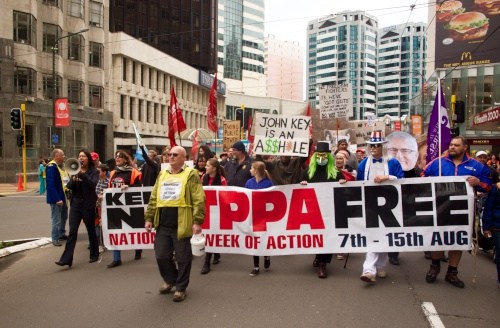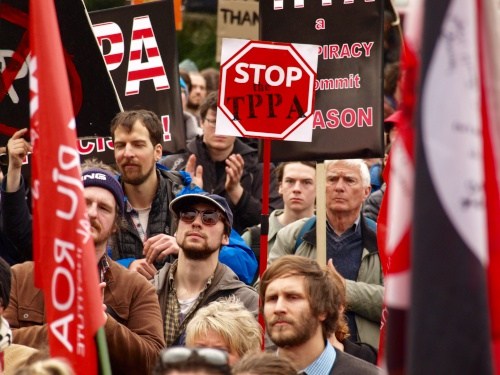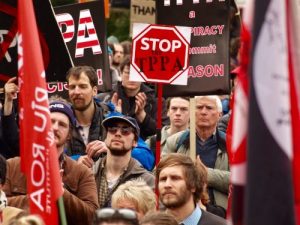The TPPA. The Trans Pacific Partnership Agreement. Say it out loud. It sounds boring doesn’t it? That’s because it is. In fact if you were to actually attempt to read the released TPPA documents you would probably drop off faster than you do whenever the word attendance is mentioned in assembly. And that’s probably why as young people we know so little about the TPPA. After all the best way to pass something quietly without teenagers kicking up a fuss is to make it as mind numbingly boring as possible.
So here are the key points you need to know about the TPPA:
- The TPPA is a free trade agreement between 12 different countries. It’s the biggest free trade agreement in history
- Free trade is just trade without taxes or tariffs on products.
- There’s a lot of other stuff tacked on to the trade which have been causing ……. issues.
So now you might wondering “ what is this shocking other stuff?. Well one of the first things to clear up about the TPPA is that a good deal of the deal of it isn’t about trade. In fact most of the deal is about regulations and requirements countries need to fulfill. It’s kind of like when you take year 12 statistics with the full expectation of the class just being about statistics and then find out a term in that you’re doing an algebra assessment. So in this situation the TPPA is the grossly mislabelled statistics class and should really be called a “regulations deal which involves free trade” instead of a “free trade deal” (and NOTHING else). Just as year 12 statistics should really be called a “statistics and other assorted maths” class.
Scoring the top spot of most controversial regulation is the ISDS process or the investor state dispute process or the “oh sweet merciful Buddha the corporations are coming for our sovereignty” process. Basically what the ISDS does is it gives investors (otherwise known as corporations) the ability to take a government to court if they feel the state has discriminated against them or significantly damaged their business prospects. An offshore court with three arbitrators who either rule in favour of the state or the investor and if the investor wins then the state generally has to give compensation.
Quick point of context:The ISDS isn’t a new thing, it was in our free trade deal with China and it’s been in a bunch of the other junk we’ve signed ourselves up to. Another point is that the state usually wins the dispute process, if not always.
So the ISDS isn’t a new thing for New Zealand but does it prevent a threat to New Zealand sovereignty? Well I think it does but not in the direct form it appears to be. So the whole corporations v countries thing isn’t great. But it has been tested and there is significant oversight of that area. So while the potential for things to go drastically wrong is definitely there I feel there’s a more probable hidden danger within the ISDS process. Much like mock exams, it lurks beneath the surface far closer than the actual externals, or in this case ISDS, but just as scary. It’s the chilling effect. The potential that our lawmakers and judges will look at the ISDS and understandably say “man I really don’t feel like being taken to court over this. Maybe I should tone it down a little.” If our lawmakers tone down otherwise strong laws out of fear of being sued then we could be in some real trouble because unlike corporations we don’t have an ISDS process.
So the whole threat to our sovereignty and ability to make laws for us is a very real issue despite the government’s stance that it isn’t an issue. Okay so we probably won’t wake up one day and see the Beehive flying a Coca Cola flag. But the potential impact could be significant.
Scooching on over to the Government’s main selling point for the TPPA……. the economy! So free trade is great for the economy like the scholarship calculus class of trade. It gets good results. National List MP Paul Foster Bell is enthusiastic about the opportunity it offers New Zealand Businesses in the competitive overseas market. Stating that “this offers New Zealand businesses a great chance to improve the quality rather than the quantity of our product going to overseas markets”.
It’s true that I oppose the TPPA but I want to clear something up. I’m not at all against trade. A strong economy is good, the more money we have to spend the sooner we get lower unemployment rates and desks that don’t wobble whenever we write on them (I mean come on we have to write internals on those!). All of these things are good. But the TPPA isn’t just trade. And even if it is genuinely just a way to tighten up regulations and standards in the participating countries it has the potential to be more than that. There are very real and genuine reasons to argue that this deal gives large corporations great power and let’s be honest hearing large corporations and power in the same sentence is a big red flag.
Now I’m prepared to accept that the trade is an ok deal for New Zealand. After our free trade deal with China our trade expanded massively. Most people for or against the TPPA agree that it will improve the economy.

The real issue though is how. Because the TPPA is a trickle down effect system and as a friend of mine once so eloquently put it “unlike mud, gold flows uphill.” Is a trickle down effect enough? Maori Party MP Marama Fox certainly doesn’t think so.
“The TPPA is only a good deal for people who already have the opportunity for wealth and education,”she said
Fox went on to explain that if the government were so certain that this is about benefiting the New Zealand population overall we “would see a raft of legislation introduced with the TPP.”
So to answer the question is the TPPA good for the economy? The answer is yes. Will the government get more in taxes meaning it can invest more in other areas. Well yes. Will more jobs be created? Probably. All these things are great and shouldn’t be understated. But in reality you’re still going to be paying of a massive student loan and will be receiving only a trickle of the actual wealth, so don’t get too excited.
Another big issue amongst the tppa bundle is patents or more specifically the extension of patents in medical fields. Whenever a company has a patent it means it has a monopoly on that thing, because no one is competing with them they can set the price however high they want. Now in some markets it doesn’t matter. I mean who cares if you have to wait a couple of years for the new rubix cube to be cheap, right? The area where it really really matters is medicine. And it matters in a life or death kinda way. So the longer the patent is in effect the more expensive the medicine is. In case you haven’t figured this out I’m going to put this in caps
THAT’S A REALLY BIG DEAL FOR A LOT OF PEOPLE!
The governments told us they’ll provide more money to Pharmac (the agency that buys our drugs and then sells it to New Zealanders at a much lower cost) so that it can afford these drugs. But where does that money come from? Tax Payers. And it should be noted that Pharmac has to pick and choose which drugs it buys. Extending patents is just withholding lifesaving drugs from suffering people for longer than necessary so that drug corporations can make more money. And I don’t have a witty analogy for that. It’s just sad.
So moving on to one of the most evil words for the internet generation…… that’s right! It’s the dreaded ‘copyright’. Under the TPPA copyright is extended by a whole 20 years and that has pretty big ramifications. Let’s be honest, as individuals we’ll probably keep downloading etc. But it’s not as individuals that this has ramifications. Take things like songs that we remix and mess around with, art we base off other art, those go under copyright for another 20 years and unless you want a court date you aren’t sharing those with the public. Materials that schools buy for their students will cost more for longer and that gets added to fees. An extra 20 years of copyright robs us of our ability to create and change our culture and things that belong to it. Green MP Gareth Hughes feels that “the Government only calculates physical costs, dollars and cents. But our culture and our sovereignty, aren’t these costs worth calculating? Just because they’re intangible doesn’t mean they’re worthless”. Labour MP for Wellington Grant Robertson agrees and urges students to “think about things beyond the physical costs when looking at the TPPA.”
But one big thing that came up was that if you are worried about the TPPA there are things you can do. As Gareth Hughes reminded us “it’s not a done deal yet”. Barry Coates leader of the Its Our Future anti TPPA campaign says “students should join the campaign and get involved” ; Grant Robertson would like you to “write submissions on the TPPA for the select committee and get in touch with MPs to tell them you’re concerned”;and Marama Fox thinks that “student action is always effective. Tell them it’s your future they’re signing away and that you’re worried!”
These are all awesome motivational positive things that you should do if you are worried about the tpp. But the fact is that National has such a large majority that they didn’t even have to debate before they signed the TPPA. In all likelihood there won’t be much that the opposition can do to stop the ratification of the TPPA. That’s what happens when you have one party with enough numbers to pass most laws on its own. You know that cool picture above that says that democracy doesn’t happen behind closed days. Well neither should this debate.
Honestly. This deal just makes me sad. Because we’ve had so little say in what’s in it and so little knowledge of how it came to be.
Because it seems to show the government’s approach to most things:
that more money will solve every problem that this country has;
and that disagreeing with the opinion of the government makes you uneducated and foolish.
The TPPA is a serious issue. It’s not something that people should be laughed at for questioning. And it isn’t something that should be ratified without full parliamentary debate and ideally a binding referendum.
Look I’m not going say that there aren’t benefits to the TPPA . When the economy grows, good things happen, new markets will be opened up by this deal and that is always a good thing. And let’s be honest there probably will be harm from not being in this deal and we have to understand that before we go and make up our minds about these things.
There are plenty of good arguments for New Zealand ratifying the TPPA. But there are plenty of good arguments for not ratifying as well.
In case you didn’t guess, I fall on this side of the argument because I believe that the potential risks that come with the TPPA outweigh the potential benefits. I hope you have enough information to make up your own minds because I’m going to go walk into the ocean now. After wading through a swamp of mind numbing legislation, economic reports and attempting to understand issues on the scale of 12 countries I have come to one shocking conclusion.
This deal is just depressing.
By Kate Mills-Workman



